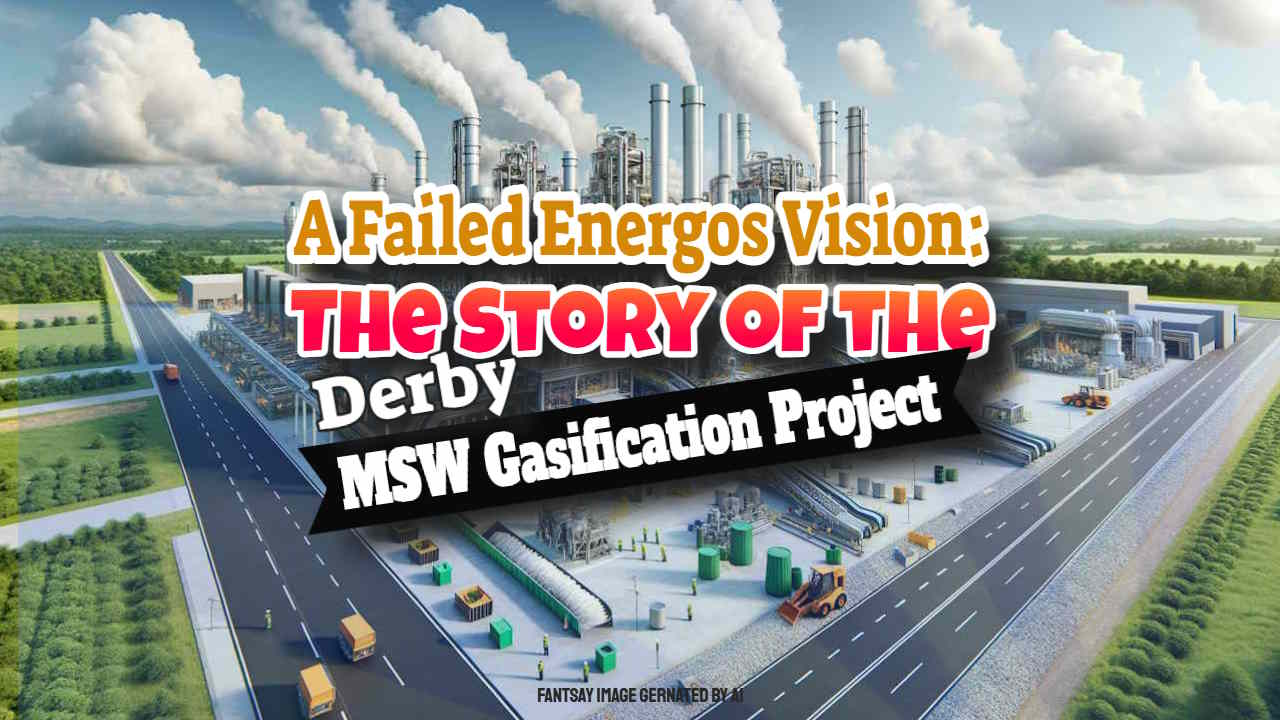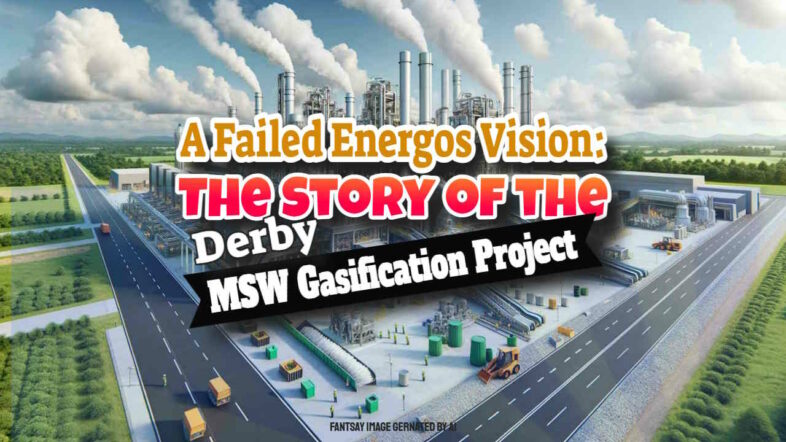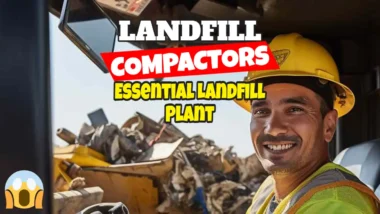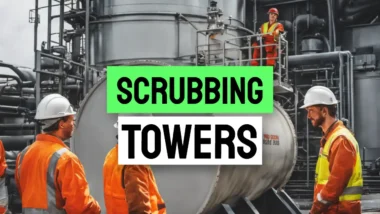This salutary story began when one of the country’s biggest suppliers of energy-from-waste technology at that time, Energos, went into administration due to problems with earlier projects.
There is nothing wrong with the concept of the combustion technology known as gasification. But, the translation of the concept into reality in the UK has so far proven unattainable at large scale for commercially operated treatment and disposal of municipal waste.
Nevertheless, it appears that when the initial trailblazer Energos went into liquidation in 2016 Derby City Council persisted in their efforts to use the technology when few, if any, others dared. To an outsider, this is surprising, as the fact that using this technology would be far from easy was there for all to see.
This is our brief understanding of the story since our last update, see below for the previous updates:
Update on Derby MSW Gasification Project December 2023
Key Takeaways
- The Derby MSW Gasification Project faced significant challenges, leading to its eventual cancellation by the council in 2019.
2. Among these challenges were budget overruns and technical issues, such as overheating, excessive odours, and an inability to process waste at the required rate.
3. These issues, coupled with community complaints about flies and smells, contributed to the project's demise. After a prolonged period of difficulties, the project agreement was terminated and there have since been ongoing efforts to determine the plant's condition and potential future use.
4. The estimated cost for these efforts was around £30 million over the last three to four years. The project's failure has led to legal actions and discussions about a financial settlement for the redundant plant.
5. There is a legal action that appears to remain outstanding in January 2024, in which the contractor is taking action against the Council.
Yet Another Update! The Facility will Reopen After Repairs
Derby and Derbyshire councillors decided in February 2023 to repair and restore the mothballed £145 million energy-from-waste gasification facility, which had been plagued by technical challenges that led to the termination of the DBO contract to build and manage it.
Based on forecasts for the next 20 years, councillors have determined that it is more cost-effective to get the plant up and running than to dispose of residual garbage differently.
According to a joint statement issued by the two councils, resolving the issues will provide certainty over estimated expenses. The councils will put out a tender for a contractor to repair and run the facility.
Derby city leader Chris Poulter gave the view that they had needed to take the time to thoroughly evaluate the options on the table so that they could make an informed decision on the facility's future.
Technical and Financial Hurdles
Engineering Challenges
One of the major stumbling blocks was the engineering complexity of gasification technology. The project struggled with adapting this technology to efficiently handle the varying composition of municipal waste.
Budget Overruns and Funding Shortfalls
Financial challenges soon became apparent. The project suffered from budget overruns, and the initial funding proved inadequate for the burgeoning costs. This led to a desperate search for additional funding, which was not forthcoming.
Environmental and Regulatory Roadblocks
Environmental Impact Concerns
Environmental issues further complicated matters. The project faced stiff opposition from environmental groups concerned about the potential emissions and their impact on local ecosystems.
Regulatory Hurdles and Compliance Issues
Regulatory compliance became another major hurdle. The project struggled to meet the stringent environmental standards set by regulatory bodies, leading to delays and additional costs.
The Downfall of the Derby Project
Project Cancellation and its Aftermath
Faced with insurmountable challenges, the project was eventually shelved. This decision led to significant financial losses and a sense of disillusionment among stakeholders.
Lessons Learned and Future Implications
The demise of the Derby MSW Gasification project serves as a cautionary tale. It underscores the risks involved in developing the technology of gasification. In such already difficult projects the importance of:
- thorough planning,
- realistic budgeting, and
- consideration of environmental impacts
in sustainable energy projects is more important than ever.

The following is the archive of our previous postings:
Derby MSW Gasification Project – Energos Preferred Bidder to UU/Interserve
January 2020 Derby MSW Gasification Project Update: With the Gasification Plant still unable to pass the requirements for an operating certificate to be granted, and no resolution in sight contract termination was been carried out in 2019. The unfortunate story unfolds in our added section below the original article reproduced here.
Autumn 2018 Update: Nearly 10 years on from our first article here, about the proposed Derby MSW Gasification Facility, it is still not built. Currently, the project is delayed thought to be partly due to the insolvency of Energos in July 2016.
Energos Appointed Preferred Bidder for Derby Gasification Project
Press Release 26-01-2009:
Gasification specialists Energos have been appointed to provide the technology for a multi-million pound waste treatment facility being built in Derby.
The company, which is part of Manchester-based renewable energy firm ENER-G, will help to develop a 140,000 tonne-a-year gasification facility on Sinfin Lane in Derby on behalf of a joint venture between United Utilities and services firm Interserve.
An artist's impression of the Sinfin Lane facility that will use Energos' gasification technology
United Utilities and Interserve were confirmed on January 13 as preferred bidder for a 27-year deal, beginning in 2010, to design, build and operate a facility to process both Derbyshire county council and Derby city council's residual household waste.
Energos' appointment means the plant will use their patented version of the advanced thermal treatment process to convert the waste into a gas, which will then be used to produce 8MW of electricity for export to the National Grid.
Energos' process has already been installed in a plant on the Isle of Wight which opened last year (see letsrecycle.com story) and, in July 2008, the company submitted a planning proposal to build an 80,000 tonne-a-year capacity facility at Knowsley, on Merseyside (see letsrecycle.com story).
The Derby project's joint venture project director, Blair Marriott, said: “We are pleased to be working with Energos which offers a world class, low emission technology and a proven reputation for excellence.
“Our proposed state-of-the-art waste management facility points the way forward for UK municipal solid waste management and is a viable and environmentally friendly alternative to landfill and incineration,” he added.
Energos' managing director, Nick Dawber, described the facility as “a community-sized solution to responsibly dealing with local waste.”
United Utilities and Interserve were announced as preferred bidder for the Derbyshire contract in December 2008, winning a lengthy head-to-head contest with Spanish-owned Waste Recycling Group (WRG) (see letsrecycle.com story).
The deal represents United Utilities first major contract success in the waste sector, though it is one of four shortlisted bidders for the Cheshire PFI contract (see letsrecycle.com story), and is also part of the consortium the ‘Resource from Waste Alliance' which is the running for the Merseyside PFI waste deal (see letsrecycle.com story).
More on the Derby Gasification Project:
End of the line’ for RRS Derbyshire contract
July 2019: The £900 million waste management contract between Derbyshire and Derby councils and Resource Recovery Solutions (RRS) has been brought to an early end due to delays in completion of the Sinfin gasification plant.
The contract with Resource Recovery Solutions (Derbyshire) Ltd – a partnership between infrastructure firm Interserve and waste management company Renewi – was signed in 2009, but reached financial close in 2014.
The Sinfin waste management facility, was due to open in 2017.
It included managing Derby’s recycling centres, providing five transfer stations and building and running the 190, 000 tonnes-per-year gasification plant in Sinfin, Derby.
The county and city councils issued a statement on Friday, August 2, stating that the contract – due to run until 2042 – has now ended and the facility “will temporarily cease to accept waste”.
However, the councils said that they still intend to use the gasification facility for the treatment of the region’s waste as this represents the ‘best value for money’ for both authorities. via LetsRecycle
Renewi prepared to quit ‘failed’ Derby gasification plant
UK: Company confirms a €64m write-off of its investment in the facility, but tells ENDS it still hopes to commission the plant. via EndsWaste&Biology
Banks call halt to troubled Derby gasification project
Renewi and Interserve’s plant is to be handed over to the new operator. via MRW
Derbyshire County Council
“We gave RRS every opportunity to get the waste treatment centre up-and-running.
“The fact that the plant has still not passed certified performance tests is clearly of enormous concern to us and the project’s funders have been unable to come up with a solution that everyone is satisfied with.”
Councillor Chris Poulter, Leader of Derby City Council, added:
“It’s clear to us that the contract with RRS has reached the end of the line so we’re not disputing this notice which formally ends the contract as of today. But this does not mean the end of the project.
“Though it’s disappointing to have ended up in this position, we’ve been preparing for the possibility of the contract coming to an end for some time now.
via Derbyshire.Gov
FAQs
- What was the Derby MSW Gasification Project?
- It was an initiative to convert municipal solid waste into energy using gasification technology.
- Why did the Derby MSW Gasification Project fail?
- It failed due to technical challenges, financial difficulties, environmental concerns, and regulatory compliance issues.
- What were the main technical challenges faced by the project?
- The main technical challenge was adapting gasification technology to handle varied waste composition efficiently.
- How did financial issues contribute to the project's demise?
- The project suffered from budget overruns and a lack of sufficient funding to cover increasing costs.
- What can be learned from the failure of the Derby project for future sustainable energy initiatives?
- Future projects should focus on realistic planning, budgeting, and minimizing environmental impacts to avoid similar failures.








